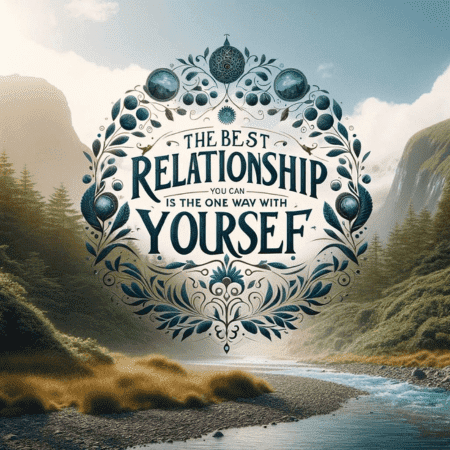In today’s interconnected world, the pressure to be in a relationship can be overwhelming. Many people find themselves longing for a partnership, driven by a mixture of societal expectations and personal desires. However, How To Stop Wanting A Relationship, offers profound personal insights and strengthened self-worth.
Humans are inherently social creatures, and the desire to connect intimately with others is deeply rooted in psychological and social factors. Understanding why you crave a relationship is the first step toward gaining emotional independence.

Psychological factors
In the context of understanding the psychological factors influencing the desire for relationships, it’s important to recognize that humans are naturally wired for connection. This drive is deeply embedded in our psyche, often guided by both evolutionary needs and individual psychological conditioning.
Attachment Styles: From early childhood, how individuals attach to their caregivers can shape their approach to relationships in adulthood. Those with secure attachment styles are typically more comfortable with intimacy and are better at forming healthy relationships. Conversely, those with insecure attachment styles (anxious or avoidant) might either cling to relationships or shun them, reflecting deeper insecurities.
Fear of Loneliness: Many people seek relationships to avoid feelings of loneliness and isolation. The dread of being alone can sometimes push individuals into relationships without genuine compatibility or desire to fill a perceived void.
Self-Esteem and Validation: Relationships can often be a mirror through which individuals see themselves. High self-esteem can lead to healthier relationship choices, whereas low self-esteem might make someone more dependent on their partner for validation.
Self-Reflection
Identifying personal needs involves understanding the specific desires, aspirations, and necessities unique to an individual. This process is crucial for personal development and life choices that align with one’s true self. It includes recognizing various emotional, physical, social, and intellectual needs. For instance, emotional needs involve the need for affection, understanding, or security, while physical needs include health and activity requirements.

Social influences
Social influences play a significant role in shaping our desires for relationships. The influences are derived from a variety of sources, such as friends, family media, culture, and practices, and can profoundly influence how we view and choose to pursue relationships.
Family Expectations Family members often have implicit or explicit expectations regarding the manner in which one should participate in relationships. These expectations can cause pressure to adhere to familial standards, causing people to focus on relationships to please the needs of their family, rather than personal.
Peer pressure: Social circles and friends can also influence one’s relationship desires. The presence of friends who are already in relationships or who value relationships can cause someone to search for connections similar to theirs, sometimes irrespective of their ability or even genuine desire.
Media Representation Movies, television and social media frequently depict relationships in a positive light, and portray them as the most important factor in happiness and satisfaction. The constant stream with romantic material can alter a person’s perception of themselves, making them feel lonely without a romantic companion.
Cultural Standards: Cultural background can influence how relationships are constructed and maintained. Some cultures emphasize the importance of being in the same relationship or being married by the age of a certain number of years, which could cause people to put a higher priority on the search for an appropriate partner.
Building Self-Sufficiency
Affirming your interests outside of the romantic realm is vital. Take part in activities, develop new skills and dedicate yourself to your own personal goals. This increases your self-esteem and lessens the burden of emotional stress on potential partners.
The development of interests and hobbies
The development of interests and hobbies is an essential aspect of your personal growth and self-sufficiency. Engaging in activities improves the living quality and offers opportunities to learning or relaxing, as well as social interactions. Here are some of the main motives and methods to develop your interests and hobbies:
Personal Fulfillment Finding hobbies and interests that connect with your interests and interests could prepare an intense satisfaction and a sense of accomplishment. If you’re into hiking, painting or playing instruments, these pursuits enable you to discover and express yourself.
Skills Growth: Hobbies often involve learning and enhancing specific skills which boost confidence and help in providing tangible benefits in different areas of daily life. For example, cooking may increase creativity and speed as well as chess playing can boost the ability to think strategically.
The ability to relieve stress: Engaging in enjoyable activities is a wonderful method to reduce stress. The attention required to engage in activities like knitting or gardening can be a type of meditation that helps relax the mind and decrease anxiety.
Social Networks A variety of hobbies could create new social opportunities. Joining groups or clubs with interests that you share can benefit you connect with like-minded individuals improve your social network and bring the feeling of belonging.
The structure as well as timetable: Adding hobbies to your weekly or daily routines could give some structure. A regular schedule of activities benefit keep work and leisure in check and benefit improve time management.
Establishing Support Networks
Although romantic bonds are important however, platonic friendships as well as social connections with others are able to prepare an emotional security and happiness. Enhance these connections to increase the support you receive.
The importance of friendships
Friendships play a significant role in our lives, offering comfort, emotional assistance and happiness. These bonds play an essential contribution to psychological well-being. They provide numerous benefits:
- emotional support: The support of friends is a assistance through tough times, and they be a part of your happiness and triumphs. This kind of emotional support is crucial in managing anxiety, stress and depression.
- Social Fulfillment Although romantic connections are a part of our personal relationships friendships are a major source of your social life, assisting provide us with meaningful interactions, and also preventing feelings of loneliness and feeling isolated.
- The perspective and the growth Friends frequently prepare diverse perspectives that can challenge us, and encourage self-reflection and personal growth. They can help us modify or even strengthen our choices.
- Entertainment and Fun Friendships can add joy to your life. The activities you share with your friends, such as watching films going to concerts, playing games, add relaxation and enjoyment and enhance the overall quality of life.
- A feeling of belonging: Having friends gives people the feeling connectedness to the group. This is particularly important when the creation of a community of support which can resemble the structure of a family, especially for those who are far from their family members.
- Health Advantages The payoff of studies have proven having close relationships with friends are able to increase your physical well-being. Friendships with support can ease stress, reduce blood pressure, and reduce the chance of developing various illnesses.
Setting Personal Goals
Concentration on making achievable personal and well-qualified goals for your personal and professional. The achievement of these goals will help in providing satisfaction and happiness that is frequently sought out in relationships.
Long-term and short-term goals
The short-term goals are usually those you wish to accomplish within a brief time frame typically within one 1 year or so. These objectives benefit to keep you focussed and focused on the immediate goals that are essential to your overall performance. These could be things like completing a task, learning a new skill or reaching a particular goal within your private and skillful life.
Long-term objectives, on the contrary, are goals you wish to actually achieve over a longer period that can span several years or even years. They offer the direction and motivation to guide your actions and decisions toward an ideal future result. The long-term goal may include job growth and financial stability or personal development or achieving your the goals of your life.
A short-term goal could be to complete a certification course in a short period of time in the long run, while a similar objective could be to move to a position of management within the next five years, making use of the knowledge gained from the certification. Achieving both long-term and short-term goals will assure a comprehensive approach to your personal and competent development which allows you to progress without losing sight of your ultimate goals.
Seeking career-oriented Help
If the desire to have relationships stems from more emotional issues, or if you have a difficult time being alone and you are in a relationship, getting skillful guidance can prove beneficial. Therapies like cognitivee Behavioral Therapy (CBT) can provide tools to manage your emotions better.

When to seek help
- Recognizing when to seek professional help for emotional or psychological challenges is crucial for maintaining mental health. Here are some key indicators that suggest it might be time to consider professional guidance:
- Persistent Sadness or Anxiety: If you experience feelings of sadness, anxiety, or emotional distress that persist for weeks or interfere with your daily activities, it may be a sign that you need professional help.
- Significant Changes in Mood or Behavior: Noticeable shifts in mood, such as frequent irritability, aggressive behavior, or an inability to control emotions, can indicate underlying issues that benefit from professional intervention.
- Withdrawal from Social Activities: If you find yourself withdrawing from friends, family, or activities you once enjoyed, this could be a sign of depression or other mental health concerns.
- Changes in Eating or Sleeping Habits: Significant changes in appetite or sleep patterns, whether an increase or decrease, can suggest emotional distress and the need for a professional assessment.
- Feeling Overwhelmed: If you feel overwhelmed by your emotions or daily responsibilities to the extent that it seem unmanageable, seeking help can provide strategies to cope and bring relief.
- Thoughts of Self-Harm or Suicide: Any thoughts of self-harm or suicide are serious and immediate reasons to seek help from mental health professionals.
- Impact on Work or School: When emotional or psychological issues begin to significantly impact performance at work or school, it can be beneficial to seek therapeutic support.
- Reliance on Substances: Turning to drugs, alcohol, or other substances as a way to cope with emotional issues is a red flag that professional help is needed.
- Professional help can come from various sources, including psychologists, psychiatrists, counselors, or social workers. These professionals provide a safe space to explore your feelings, understand the root of your problems, and develop strategies to address them effectively.
You May Find Helpful
- How to Apologize for Cheating and Lying Letter
- How to End an Emotional Affair and Still Be Friends
- Tips for Building a Healthy Relationship
Redirecting Energy
Channel your emotional energy into positive activities. Engaging in volunteer work or community service can be incredibly fulfilling and can help shift your focus from what you feel you lack to what you can offer.

Personal growth and acceptance
Personal growth and acceptance are fundamental aspects of developing a well-rounded and satisfying life. They involve continuously evolving emotionally, intellectually, and spiritually while also embracing one’s current state and circumstances. Here’s what these concepts entail:
- Personal Growth: This is the ongoing process of understanding and developing oneself to achieve one’s fullest potential. Personal growth includes learning new skills, expanding one’s knowledge, improving personal habits, and seeking new experiences. It is driven by self-reflection, curiosity, and the desire to improve. Setting personal goals, such as career advancement or personal health, plays a significant role in this process. This journey is not only about enhancing abilities but also about expanding personal awareness and understanding.
- Self-Acceptance: While personal growth is about looking forward, self-acceptance is about being at peace with who you are at the moment. This includes acknowledging your strengths and weaknesses and forgiving yourself for past mistakes. Self-acceptance is crucial because it forms the foundation of personal growth; without accepting who you are now, it can be challenging to make meaningful changes.
- Balancing Growth and Acceptance: It is important to balance the drive for personal growth with the need for self-acceptance. Constantly striving for improvement without acknowledging your current virtues can lead to dissatisfaction and a feeling of never being good enough. Conversely, too much contentment with the current state can lead to complacency and hinder growth.
Benefits: Engaging in both personal growth and self-acceptance leads to numerous benefits:
- Improved Mental Health: It enhances overall well-being by reducing anxiety and depression and increasing life satisfaction.
- Resilience: By fostering a better understanding of oneself, individuals can develop resilience against adversity.
- Better Relationships: Understanding and accepting yourself can lead to healthier interactions with others, as self-awareness often promotes empathy and better communication.
Conclusion
Embracing a life without the active pursuit of a relationship is not about giving up on love, but rather about building a life that is rich, fulfilling, and self-sufficient. When you are comfortable with yourself, you are more likely to attract healthy relationships that complement your fulfilled life.
